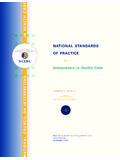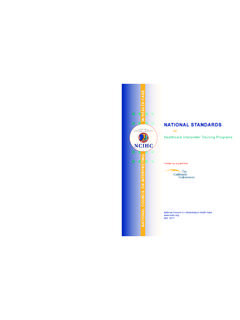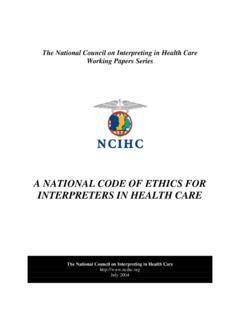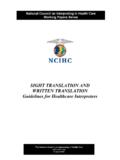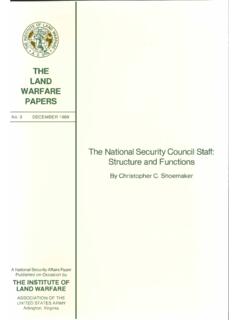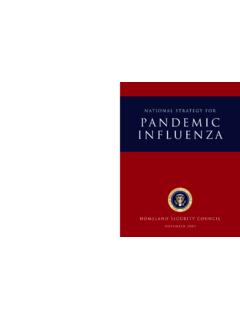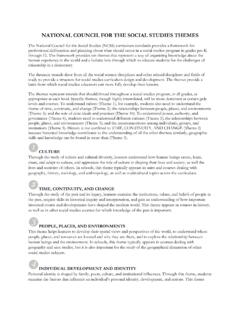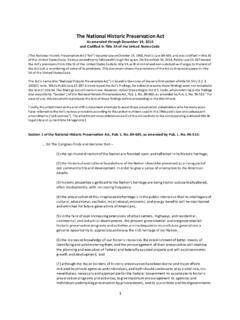Transcription of National Code of Ethics for Interpreters in Health Care
1 The National council on Interpreting in Health Care Working Papers Series A National CODE OF Ethics FOR Interpreters IN Health CARE The National council on Interpreting in Health Care July 2004 A National Code of Ethics for Interpreters in Health Care July 2004 Page 2 of 23 Acknowledgements This work would not have been possible without the vital input of Interpreters and others who dedicated their time and knowledge to further the Health care interpreter profession. The financial support given by the Department of Health and Human Services Office of Minority Health , Guadalupe Pacheco, Program Officer, was essential in getting this project started. We would like to acknowledge Maria Paz Avery for her work as primary author of "Understanding the National Code of Ethics for Interpreters in Health Care" working paper. We would also like to take this opportunity to thank the members of the NCIHC Standards, Training and Certification Committee: Karin Ruschke, , Co-Chair; Shiva Bidar-Sielaff, , Co-Chair 2003-2005; Linda Haffner, Co-Chair 2001-2003, current committee member; Maria Paz Avery, ; Bruce Downing, ; Carola Green.
2 A special thank you to Susan Kocher for meticulously collating the hundreds of survey responses we received and Patricia Ohmans for her insightful recommendations on how to best analyze the data. Lastly, we are grateful to Esther Diaz for her help in the final months of this project. NCIHC Board Wilma Alvarado Little, MA, Co-Chair of the Board Maria Michalczyk, RN, MA, Co-Chair of the Board Elaine Quinn, RN, MBA, CST, DSA, Treasurer Lisa Morris, MSTD, Secretary Cynthia E. Roat, MPH, Chair of the Advisory Committee Karin Ruschke, MA, Co-chair of the Standards, Training and Certification Committee Shiva Bidar Sielaff, MA, Co-chair of the Standards, Training and Certification Committee Elizabeth Jacobs, MD, Co-chair of the Research and Policy Committee Alice Chen, MD, Co-chair of the Research and Policy Committee Joy Connell, Co-chair of the Organizational Development Committee Esther Diaz, M Ed, Co-chair of the Organizational Development Committee Julie Burns, M Ed, Co-chair of the Membership and Outreach Committee Susy Martorell, MPH, Co-chair of the Membership and Outreach Committee A National Code of Ethics for Interpreters in Health Care July 2004 Page 3 of 23 Code of Ethics for Interpreters in Health Care The interpreter treats as confidential, within the treating team, all information learned in the performance of their professional duties.
3 While observing relevant requirements regarding disclosure. The interpreter strives to render the message accurately, conveying the content and spirit of the original message, taking into consideration its cultural context. The interpreter strives to maintain impartiality and refrains from counseling, advising or projecting personal biases or beliefs. The interpreter maintains the boundaries of the professional role, refraining from personal involvement. The interpreter continuously strives to develop awareness of his/her own and other (including biomedical) cultures encountered in the performance of their professional duties. The interpreter treats all parties with respect. When the patient s Health , well-being, or dignity is at risk, the interpreter may be justified in acting as an advocate. Advocacy is understood as an action taken on behalf of an individual that goes beyond facilitating communication, with the intention of supporting good Health outcomes.
4 Advocacy must only be undertaken after careful and thoughtful analysis of the situation and if other less intrusive actions have not resolved the problem. The interpreter strives to continually further his/her knowledge and skills. The interpreter must at all times act in a professional and ethical manner. A National Code of Ethics for Interpreters in Health Care July 2004 Page 4 of 23 Understanding the National Code of Ethics for Interpreters in Health Care The role of interpreter is a tightrope balancing act: A code of Ethics is a good guide for the bar carried on such a walk on the tightrope. It offers balance, some security and especially is a comfortable way to face the unknown risks faced on the interpreter s path. Anonymous Respondent to Code of Ethics Survey Introduction As the profession of Health care interpreting in the United States matures and evolves, the importance of creating shared understandings of what is considered high quality and ethically appropriate principles and practices in the field becomes imperative.
5 To this end, the National council on Interpreting in Health Care identified three steps that needed to take place on a National level in order to standardize the expectations that the Health care industry and patients should have of Interpreters and to raise the quality of Health care interpreting. The first step was to create and build support for a single Code of Ethics that would guide the practice of Interpreters working in Health care venues. The second step was to develop a nationally accepted, unified set of Standards of Practice based on the Code of Ethics that would define competent practice in the field. The third step was to create a National certification process that would set a standard for qualification as a professional Health care interpreter. (NCIHC, 2004) The Standards, Training and Certification (STC) Committee of the National council on Interpreting in Health Care (NCIHC) took on the task of bringing the first step to fruition.
6 The goal of the STC Committee was to create a National code of Ethics that would provide the growing profession with a set of shared, essential guiding principles expressing what are considered morally appropriate behaviors for its practitioners as they perform their day-to-day duties. To achieve this goal, the STC Committee engaged in a systematic process of reviewing existing codes of Ethics , creating a draft code, conducting National focus groups to review the draft, and eliciting feedback through a National survey. The challenge was to design a code that built on and solidified existing work at the same time that it expanded upon this work to ensure its relevance to all Health care Interpreters , irrespective of the languages or particular venue in which they were working. The STC Committee started by identifying and collecting existing codes of Ethics in Health care and other related areas such as legal and sign language interpreting.
7 This process surfaced a number of codes that were already in use at the local level by state and National associations of Interpreters , institutions of Health care, interpreter service organizations, and court programs in the United States and Canada. The STC Committee then focused on ten codes that were considered most relevant to their work and compared them in order to identify the elements that were held in common and to analyze how each approached those issues that were most difficult and controversial in the field. Based on its analysis, the STC Committee drafted a code that included the elements shared across these existing codes as well as a few that were controversial but relevant. This draft also included a short commentary after each principle that further explained and illustrated that principle. A National Code of Ethics for Interpreters in Health Care July 2004 Page 5 of 23 In the fall of 2002, the STC Committee presented the draft code to working Interpreters across the country for review and comment.
8 Focus groups were organized in nine localities across the United States. Attention was paid to the composition of these focus groups to include a broad representation of language groups and modes of service delivery ( face to face and telephone interpreting). The focus groups confirmed the need for a unified National code of Ethics and affirmed its development as a positive step for the profession. The feedback from the focus groups also concluded that the draft code was fundamentally complete and appropriate although some principles were seen as more or less controversial. Based on the focus group feedback, a second draft of the code of Ethics , including the commentaries, was developed, incorporating consistently recommended changes. This second draft was then introduced to a larger cross-section of working Interpreters through a survey that was disseminated through the NCIHC website and state associations of Health care Interpreters .
9 Approximately 2500 surveys were distributed, with a return rate of 20%. The STC Committee then analyzed the data from the 500 returned surveys. In analyzing these data, it became apparent to the Committee that there was strong agreement on the principles as stated in the draft. It was mostly the commentaries that generated controversy in the form of disagreement with the explanations and unresolved questions about implementation. Therefore, in creating the final draft of the code, the STC Committee decided to highlight the consensus there was on the principles themselves by publishing the code as a set of principles without commentary. The STC Committee agreed that further explanation of the principles would be better left to a companion document that could offer a more thorough discussion of the issues raised and to the development of standards-of-practice that would address the practical questions of implementation.
10 Having considered all the feedback it had received, the STC Committee created a final draft of the code. However, before officially approving the code, the final draft was also sent to a select number of Health care providers and medical ethicists for comment. The National Code of Ethics for Interpreters in Health Care is the result of this systematic, deliberate, and reflective process. The STC Committee is confident that this code represents the principles that working Interpreters believe are important to ensure the ethical practice of their profession. These principles are the ones that working Interpreters have said merit serious consideration when faced with a dilemma or difficult choice and to which they agree to be held accountable. This document provides a guide to understanding the National Code of Ethics for Interpreters in Health Care. It was apparent from the responses to the survey that not everyone in the field had the same understanding of the concept of Ethics , what a code of Ethics represented, what this code meant in the course of professional practice, and what the difference was between a code of Ethics and standards of practice.

